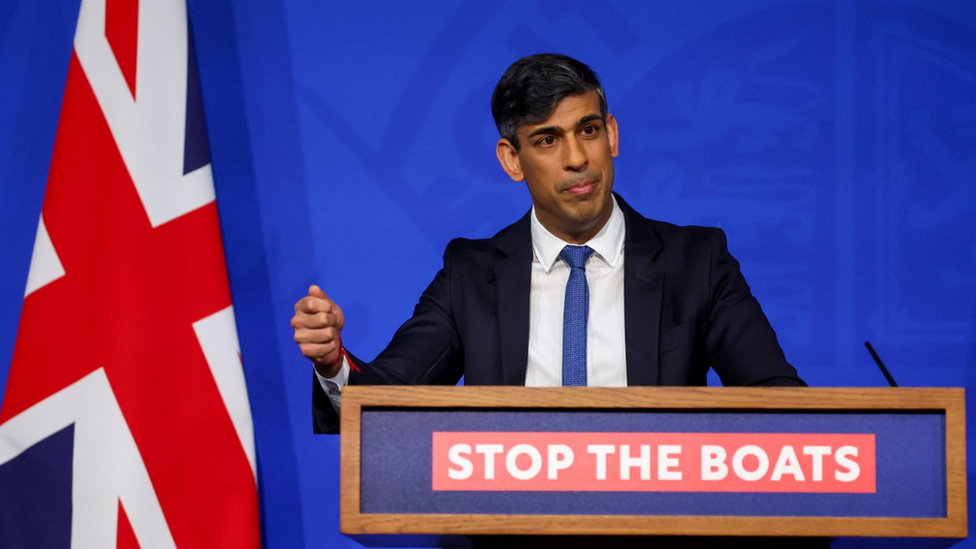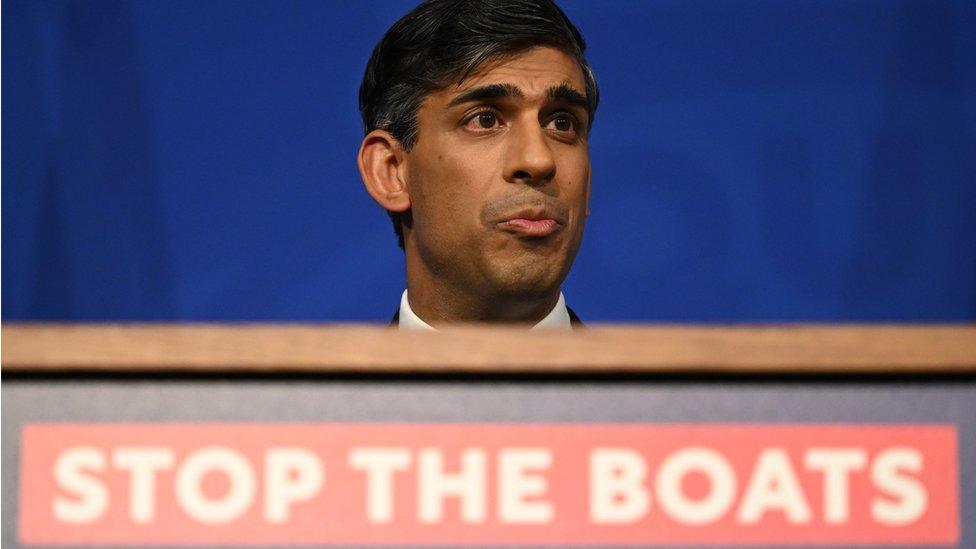Rwanda asylum bill is too weak to be a deterrent, says Robert Jenrick
- Published
Watch: Robert Jenrick on why he resigned from government
Former immigration minister Robert Jenrick has said Rishi Sunak is making "a political choice" to revive Rwanda asylum scheme in a way that is unlikely to work.
In his first interview since quitting his post, Mr Jenrick told the BBC the draft law was "weak" and would be "bogged down" by legal challenges.
Everyone who "understands" asylum law thinks the bill will fail, he added.
He added that he would not support the bill at a crucial vote on Tuesday.
The government has introduced the legislation to revive its scheme to send people seeking UK asylum to the east African country, after the policy was ruled unlawful by the Supreme Court last month.
The legislation seeks to declare in UK law that Rwanda is a safe country to send refugees to - thereby stopping flights being grounded on legal grounds.
Mr Sunak made "stopping" small boats crossing the English Channel one of his top pledges earlier this year, with figures showing 45,774 people made the journey last year.
A total of 24,830 have continued to arrive in the first nine months of 2023 and, despite the dip in arrivals, it is expected to be a key issue ahead of the general election expected next year.
But, speaking to BBC One's Sunday with Laura Kuenssberg, Mr Jenrick said the legislation in its current form would still allow a "range of legal claims that will bog down our scheme".
"I'm afraid it's very clear to all those people who really understand how this system operates that this bill will not succeed," he told the programme.
He added that people under threat of deportation would still be able to appeal on the grounds that Rwanda, even if generally safe, is not individually safe for them.
"I think that a political choice has been made to bring forward a bill which doesn't do the job," he said.
He had quit as immigration minister because he couldn't ask MPs to vote for a legislation he deemed "a weak bill that won't work," he added.
The government had already introduced two bills to deal with the issue of illegal migration, he said, adding: "It's three strikes or you're out".
Although he conceded the Rwanda plan could eventually lead to some "symbolic" flights taking off, there would not be enough deportations to deter people from crossing the English Channel.
The bill to revive the scheme has divided opinions among Conservative MPs, whose support Mr Sunak will need to ensure the bill passes its first parliamentary stage next week.

Ministers argue the threat of deportation to Rwanda will deter people from crossing the English Channel in small boats
The prime minister has previously insisted his legislation will only allow legal challenges from those who can prove they are at "real and imminent risk of serious and irreversible harm".
Speaking on the same programme, Housing and Communities Secretary Michael Gove echoed this point, adding that only a "vanishingly small" number of appeals would still be allowed.
The government's law had already been endorsed in a "plethora of legal opinion," he said, and was a "robust bill that is legally sound".
Some liberal Tories have argued it goes too far in trying to bypass the courts, and puts the UK at risk of breaching its international legal obligations towards refugees.
But others on the right of the party say it does not go far enough, and will continue to be derailed by legal challenges.
Mr Jenrick added that he, along with like-minded Conservative MPs, hoped to persuade ministers "that there is a better way" to design the new law, adding he wanted the bill to work and create a "powerful deterrent".
Tory faction fight
The different factions within the Tory party are taking legal advice on the legislation, and are expected to deliver their verdict on the bill before Tuesday's vote.
On Sunday, a leading member of the European Research Group (ERG) - a group on the right of the party - said its own legal advice found the law was not fit for purpose.
Writing in the Sunday Telegraph, external, Sir Bill Cash said the current wording of the legislation was not "sufficiently watertight".
At the vote on Tuesday, MPs will be asked to decide whether the bill should be blocked completely, or allowed to progress to its next stage in Parliament.
Labour and opposition parties have already said they will try and vote it down, meaning the government needs to ensure enough Tory MPs vote for it to allow it to pass.
Tory critics of the bill could decide to allow the bill to pass at this stage, possibly by abstaining, in the hope of securing concessions from the government as it goes through the Commons.
Minimum salary hike
Mr Jenrick also warned the Tories would face "red hot fury" from voters unless the party is able to do more to tackle both legal and illegal migration.
The governmentunveiled measureslast week to reduce levels of legal migration, following a backlash within the party after official figures showed it reached a record 745,000 in 2022.
Labour has also said it thinks legal migration is too high, blaming the current high levels on a lack of training and skills development for Britons.
Also speaking to Laura Kuenssberg, shadow work and pensions secretary Liz Kendall said the party agreed with a government decision to raise the £26,200 minimum salary to apply for a UK work visa.
However she refused to say whether its proposed hike to £38,700 was the right level, adding her party would like official migration advisers to publish their evidence first.
Related topics
- Published13 June 2024

- Published9 December 2023
